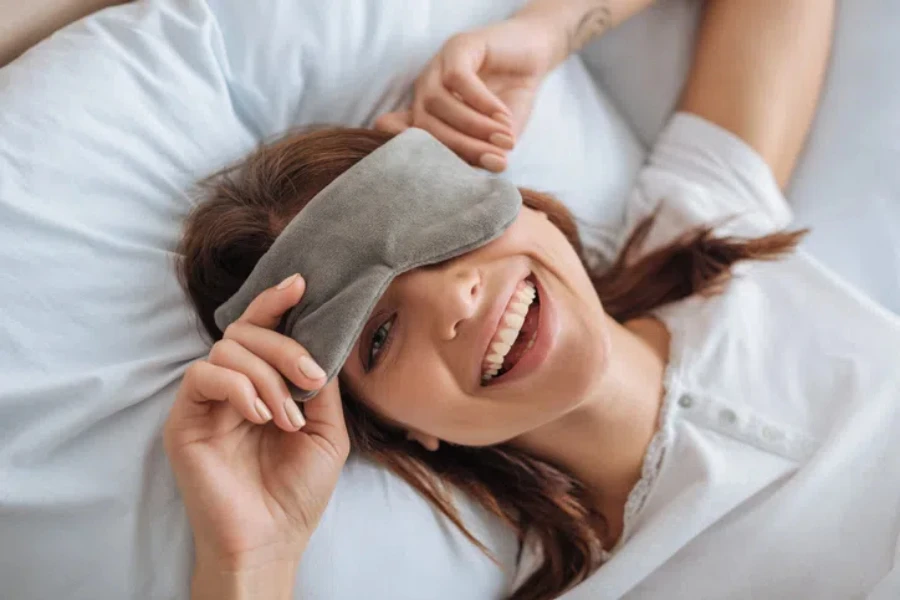In the quest for a restful night’s sleep, a simple yet effective tool often goes unnoticed: the sleep mask. This unassuming accessory holds the power to enhance the quality of your sleep, contributing to improved health and well-being. In this article, we’ll explore the top five aspects of sleep masks that users find most valuable, from the science behind how they aid sleep to selecting the perfect one for your needs. Join us as we delve into the world of sleep masks, uncovering the secrets to unlocking their full potential.
Table of Contents:
– The science behind sleep masks and sleep quality
– Types of sleep masks and their materials
– Features to look for in a sleep mask
– How to care for your sleep mask
– Integrating a sleep mask into your nightly routine
The science behind sleep masks and sleep quality:

Sleep masks, by design, block out light, creating an artificial darkness that can significantly improve sleep quality. Light exposure at night can interfere with the body’s circadian rhythm, the internal process that regulates the sleep-wake cycle. By eliminating light pollution, sleep masks promote the production of melatonin, a hormone responsible for sleep, facilitating a quicker transition to deep sleep.
Research has shown that the use of sleep masks can not only shorten the time it takes to fall asleep but also increase the duration of REM sleep. This phase of sleep is crucial for cognitive functions such as memory, learning, and emotional regulation. Therefore, incorporating a sleep mask into your bedtime routine can have profound effects on both your physical and mental health.
The benefits of sleep masks extend beyond just blocking light. For individuals living in bustling urban environments or those with irregular sleep schedules, such as shift workers, sleep masks serve as a portable and convenient solution to maintain sleep hygiene in less-than-ideal conditions.
Types of sleep masks and their materials:

Sleep masks come in various types and materials, each offering unique benefits. The most common materials include silk, cotton, and synthetic fibers. Silk masks provide a luxurious feel and are gentle on the skin, making them an excellent choice for those with sensitive skin or allergies. Cotton masks are breathable and comfortable, ideal for hot sleepers. Synthetic materials, while less natural, offer innovative features such as contoured designs that reduce pressure on the eyes.
The choice of material can also affect the mask’s ability to block light. Thicker and denser fabrics typically offer better light-blocking capabilities. Some masks incorporate additional padding or layers to enhance this effect, providing an even darker environment conducive to sleep.
When selecting a sleep mask, consider your personal needs and preferences. For instance, if you’re prone to acne, a breathable and hypoallergic material like silk might be the best option. On the other hand, if you require complete darkness to fall asleep, a mask with a contoured fit and extra padding might be more suitable.
Features to look for in a sleep mask:

When shopping for a sleep mask, several features can enhance its effectiveness and comfort. Adjustable straps ensure a snug fit, preventing the mask from slipping off during the night. For side sleepers, a mask with a slim profile might offer more comfort. Additionally, some masks come with built-in sound-muffling properties, providing a dual function of blocking out both light and noise.
Another consideration is the mask’s maintenance. Opt for materials that are easy to clean and maintain, ensuring hygiene and durability. Some sleep masks are machine washable, while others require hand washing.
Ultimately, the right sleep mask is one that meets your specific needs, providing comfort, darkness, and an added layer of tranquility to your sleep environment.
How to care for your sleep mask:

Proper care and maintenance of your sleep mask are crucial to its longevity and effectiveness. Always follow the manufacturer’s instructions for washing and drying. For most masks, a gentle hand wash with mild detergent is sufficient. Avoid using bleach or fabric softeners, as these can degrade the material over time.
Drying your sleep mask correctly is also important. Lay it flat to dry, away from direct sunlight or heat sources, to preserve its shape and elasticity. Regular cleaning not only extends the life of your sleep mask but also ensures it remains a hygienic part of your sleep routine.
Integrating a sleep mask into your nightly routine:

Incorporating a sleep mask into your nightly routine can be a simple yet transformative step towards better sleep. Begin by selecting a mask that feels comfortable and effectively blocks out light. Wear the mask each night, making it a consistent part of your bedtime ritual.
Pairing the sleep mask with other sleep-promoting practices, such as limiting screen time before bed and maintaining a regular sleep schedule, can amplify its benefits. Over time, the sleep mask can become a cue for your body, signaling that it’s time to wind down and prepare for rest.
Conclusion:
A sleep mask is more than just a bedtime accessory; it’s a tool for enhancing the quality of your sleep and, by extension, your overall health and well-being. By understanding the science behind sleep masks, choosing the right material and features, and caring for it properly, you can make the most of this simple yet effective sleep aid. Embrace the darkness, and let a sleep mask guide you towards a more restful and rejuvenating night’s sleep.




